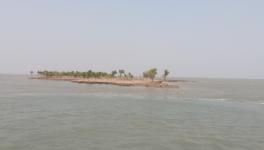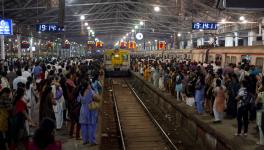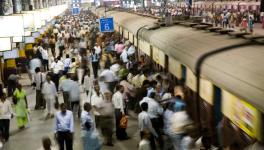Wildlife Expert Panel Red-Flags Western Ghat Rail Project Despite Aggressive Push by Karnataka
Representational Image. Image Courtesy: Wikimedia Commons
New Delhi: A proposal to develop a railway corridor through the ecologically sensitive Western Ghats, connecting the towns of Hubbali in central Karnataka with Ankola on the state’s Arabian Sea coastline, has been red-flagged by a central government expert panel. The seven-member panel, which was constituted by the Standing Committee of the National Board for Wildlife (NBWL), has rejected the proposal submitted by the Railways on the grounds that the project in its present form will entail a great deal of damage to forests, ecology and wildlife of the region.
The Standing Committee has recommended organising a workshop with various government stakeholder agencies, including the Railways so that an integrated plan for developing the rail corridor can be put together. In a meeting – the minutes of which were published on January 27 – NBWL members stated that the Railways has taken only its own concerns into consideration in the design of the environment mitigation plan of the project.
Nonetheless, activists have raised concerns over the fact that during the aforementioned meeting, deliberations were held amongst NBWL members to consider if at all the project could be developed as a double-lined corridor.
“ … the mitigation measures proposed in the project are not sufficient which have been proposed based on railway’s convenience and not by considering the wildlife movement. Therefore, the project proposal is not acceptable in the present form and the proposal requires a lot of modifications,” states the minutes of the Standing Committee’s meeting.
The proposed 167-km-long project, which was first mooted by the central government in 1997-98 when Atal Bihari Vajpayee was the prime minister of the country, has, since its inception, been opposed by conservationists and ecologists. Civil society members have repeatedly alleged that the project was conceived to help export minerals from the hinterlands of Karnataka by enabling transportation to the seacoast through the Western Ghats notwithstanding the adverse impacts it would have on the fragile ecology of the region.
Following the discussions in the Standing Committee’s meeting, it was decided that a workshop would be organised by the Union Ministry of Environment, Forests & Climate Change under the chairmanship of the Additional Director-General (Wildlife) with officials of the Railways ministry, the National Highways Authority of India, the Gati Shakti, the state government of Maharashtra and experts from the Indian Institute of Technology in Dharwad, the Indian Institute of Science in Bangalore and the Central Public Works Department to discuss the project proposal in detail. There is no word in the minutes of the meeting as to whether ecologists working on the Western Ghats, which has been designated a World Heritage Site by UNESCO, will be invited to the workshop.
“It will be unfortunate if the Standing Committee of the NBWL will keep out conservationists, ecologists and environmentalists, whose focus area is the Western Ghats, from meetings convened to discuss this environmentally disastrous project. The NBWL, which is chaired by the Hon’ble Prime Minister, has not met even once since 2014, though it is legally required to meet at least twice a year. All decisions are being taken by its Standing Committee. These decisions are not being ratified by the NBWL. Will the Standing Committee continue to take all decisions on behalf of the NBWL for all times to come?” asked Debi Goenka of the non-profit Conservation Action Trust, which works on issues concerning wildlife and forests.
The proposed railway line will pass through corridors used by tigers since time immemorial for movement between areas which have been notified as protected areas by the government of India. The tiger movement corridor in question connects Kali Tiger Reserve in the Uttara Kannada district of Karnataka with the Sharavathi Lion Tailed Macaque Wildlife Sanctuary which is spread across the forests of Uttara Kannada and Shivamogga districts. The expert panel constituted by NBWL’s Standing Committee had undertaken field visits to the area in the last week of September 2022. In the report that it submitted to the NBWL on 26 December 2022, the panel found certain gaps and discrepancies in the project proposal and recommended that the proposal in its present form should not be considered for approval.
The need for an integrated plan for the railway project, involving various government stakeholders, has arisen because a road widening proposal is also on the anvil in the region. Members of the NBWL Standing Committee have assessed that though the proposal entails the diversion of 595.64 hectares of forest land, the cumulative impact of the project will be over nearly 1,000 acres of forest land.
“It [the proposed railway corridor] has got enormous implications for the overall integrity, biodiversity, animal passages of the Western Ghats which has to be addressed. He [NBWL member Dr Sukumar] further stated that there has been a range expansion of elephants. The elephants are now crossing these areas. There are evidences that tigers are moving from Kali Tiger Reserve to Sharavathy (sic.) Sanctuary,” states the minutes of the Standing Committee’s meeting.
The seven-member expert panel, as stated in the minutes of the meeting, took a balanced view in terms of the need for establishing connectivity between Karnataka’s coastal area and its hinterland. Given the superiority of energy efficiency of railways in the transportation of goods in comparison to the road network, where the number of accidents is also substantially higher, the Standing Committee of the NBWL deliberated upon a double-line railway corridor instead of a single-line corridor which has been planned at present.
“ … there is a need for avoided deforestation. This can be demonstrated by dropping the proposal for doubling of the railway line between Vasco-Castlerock-Tinaighat stations. The proposal between Honnavar to Talaguppa railway may also be dropped since it would pass through the denser forest area. The railways need to demonstrate avoided deforestation and also that this railway line would be a major transportation hub between Karwar and Hubballi … There are tunnels proposed in the project. The railways need to examine if there could be a larger proportion of tunnels in the project,” it is further stated in the minutes of the standing committee’s meeting.
However, activists have also questioned the NBWL Standing Committee’s mandate, whatsoever, to discuss, deliberate or recommend plans and details of infrastructure projects. They have expressed fears that the development of a double-lined corridor might result in greater destruction, diversion and damage of the tiger habitats. For justifying their opposition to the project, activists have invoked Section 35 (6) of the Wildlife (Protection) Act, 1972, as per which, any destruction or removal of any wildlife, or the destruction, damage or diversion of the habitat of any wild animal, can be permitted only if it is found to be “necessary for the improvement and better management of wildlife”.
“The primary role of the NBWL is to ensure the protection of wildlife. It is a kind of barter system being mulled about when it is proposed that certain sections of the proposed railway corridor can be double-lined while certain other corridors where the density of forests is higher will have a single-line corridor. A double line will be catastrophic simply on account of the number of trees that will have to be felled notwithstanding the damage that it will entail upon wildlife and ecology of the area. The Supreme Court of India has already nullified a clearance by the NBWL for doubling another railway line in the Western Ghats which was mooted to run from Castlerock in Karnataka to Kullem in Goa. The nullification was on the basis of the report of a Central Empowered Committee which termed the project as destructive for the fragile ecology of the Western Ghats,” said wildlife conservationist Joseph Hoover.
On May 9. 2022, a bench of the Supreme Court of India headed by Justice L Nageshwara Rao had set aside the clearance granted by NBWL’s Standing Committee to the Castlerock-Kullem railway line project on environmental grounds. The order was issued upon a PIL filed by the NGO Goa Foundation. Environmentalists in Goa and Karnataka were opposed to three projects that had been cleared by the Standing Committee including doubling of the railway track, expansion of a stretch of NH 4A (from Anmod near Goa-Karnataka border to Mollem) to four lanes and laying of a 400-kV transmission line from Sangod in Goa to the Karnataka border. The Central Empowered Committee constituted by the Supreme Court to examine the feasibility of doubling the Castlerock-Kullem railway line had termed the project as “unjustified”. It had stated in its report submitted in April 2021 that the project “will destroy the fragile ecosystem of the Western Ghats which is an internationally recognised Biodiversity hotspot and also one of the most important wildlife corridors of the country”.
Regarding the proposed Hubbali-Ankola railway line, a Central Empowered Committee of the Supreme Court had said in August 2015 that the project’s “huge and irreparable” ecological impact would “far outweigh” its “actual tangible benefits”. NewsClick had, in a report published in October 2022, highlighted the dubious manner in which the Karnataka State Wildlife Board had cleared the project in the midst of the Covid pandemic allegedly at the behest of an industry-politician nexus.
The writer is an independent journalist. The views are personal.
Get the latest reports & analysis with people's perspective on Protests, movements & deep analytical videos, discussions of the current affairs in your Telegram app. Subscribe to NewsClick's Telegram channel & get Real-Time updates on stories, as they get published on our website.
























